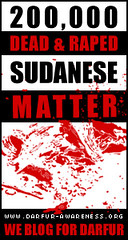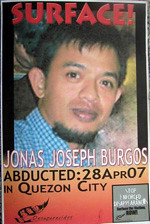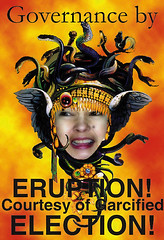Continue the Heroic Legacy of Struggle for Rights, Dignity & Liberation
Philippine Independence Day Celebration Statement
New York City, NY
June 7, 2009 On this anniversary of the nominal independence of the Philippines, DAMAYAN Migrant Workers Association and Ugnayan ng mga Anak ng Bayan celebrate Filipino heroes and heroines who fought for genuine independence in the Philippines, and who continue to struggle for rights, recognition, dignity and liberation in the US.
On this anniversary of the nominal independence of the Philippines, DAMAYAN Migrant Workers Association and Ugnayan ng mga Anak ng Bayan celebrate Filipino heroes and heroines who fought for genuine independence in the Philippines, and who continue to struggle for rights, recognition, dignity and liberation in the US.
Filipinos have been in the US in large numbers since the farm workers of Hawaii and California in the early 1900’s. And yet now, 100 years later, many in our community are still invisible, marginalized from the mainstream. Some estimates put the number of undocumented Filipinos in the US at 1 million. Lack of status paralyzes so many in our community. Fear of confronting abusive employers, fear of accessing social services, fear of asserting ourselves as women, are still pervasive problems for a community that has been part of the so-called American “melting pot” for a century—almost half its very existence as an experiment in democracy.
The observation of Carlos Bulosan, who has been called a Filipino-American hero, still rings true to so many in our community over 50 years later: “I feel like a criminal running away from a crime I did not commit. And this crime is that I am a Filipino in America.”
Confronting our history helps us understand our present. And our history as Filipinos in America has always been the direct result of American conquest of the Philippines.
The truth is that the US stole independence from the Filipino people. National hero Andres Bonifacio successfully led the national armed revolution against Spanish colonizers when the US bought the Philippines through the $20 million Treaty of Paris package deal. A US imperial war was waged, killing 1.5 million Filipinos between 1898 and 1904. Brute US racism and pacification through benevolent assimilation transformed the entire Philippine economy, politics and culture. Training an elite class to defend US interest, the US granted the Philippines nominal independence in 1946. With complete control over the Philippines, the US colonizers sealed the fate of the Filipino people, systematically structuring an unequal relationship between a master and its slave.
As part of the colonial relationship, the US benefited from the cheap human labor of the Philippines. Throughout the past 100 years of our history in America, Filipinos were recruited to fill the economic needs of the US. In order to escape poverty and unemployment, Filipinos were left with no choice but to go abroad in search of a better life.
Social marginalization and economic hardship are common threads of our experience as Filipinos in the US. Separated from family and social support in the motherland, Filipinos in the US are vulnerable to systemic racism. Government policies such as the 1926 Anti-Miscegenation Law, the 1934 Tydings-McDuffie Act and the 1946 Rescission Act have ensured the continued subjugation of the Filipino community in America that began with US colonization. We are an exploited people in the Philippines, and continue to be an exploited people here in America.
The fact that a segment of our community in the US has achieved relative economic security as medical professionals and business people, obscures the fact that a large majority of our community experience hardship as working class immigrants. The identity crises and loss of language of US-born youth, and the experiences of Filipino women who are objectified and valued less than men are all part of our experience as Filipino Americans that we must address. The recent wave of Filipinos who have migrated in the last 20 years face intensified challenges – working as restaurant, domestic, retail and service workers. The vast majority are highly educated but forced to do low-wage and devalued work because of lack of immigration status.
Filipinos must rise to the occasion of the global economic crisis.
We are a facing a historic time defined by a deep crisis on a global scale. We must meet the challenges facing our community. The Filipino population in the US will only increase—and so will the needs and demands of a rapidly growing and changing community. In January 2009, the POEA (Philippine Overseas Employment Agency) reported deploying 4,300 migrant workers to 196 different countries. That number does not even include Filipinos leaving on tourist visas. Since 2001, the number of overseas Filipinos going abroad to find economic livelihood has dramatically doubled, indicating the worsening economic and political crisis in the Philippines.
The American public waits for results from the Obama administration’s unprecedented bailouts worth trillions of tax dollars. But we cannot wait any longer than 100 years of being Filipino Americans in the margins. We must continue the struggle for full legalization, workers’ rights, healthcare and relevant and affordable education, at the same time that we demand genuine change in the Philippines.
Continue the struggle for genuine independence in the Philippines!
Justice, dignity, and liberation for Filipino domestic workers!
Full legalization for immigrants!
 On this anniversary of the nominal independence of the Philippines, DAMAYAN Migrant Workers Association and Ugnayan ng mga Anak ng Bayan celebrate Filipino heroes and heroines who fought for genuine independence in the Philippines, and who continue to struggle for rights, recognition, dignity and liberation in the US.
On this anniversary of the nominal independence of the Philippines, DAMAYAN Migrant Workers Association and Ugnayan ng mga Anak ng Bayan celebrate Filipino heroes and heroines who fought for genuine independence in the Philippines, and who continue to struggle for rights, recognition, dignity and liberation in the US.Filipinos have been in the US in large numbers since the farm workers of Hawaii and California in the early 1900’s. And yet now, 100 years later, many in our community are still invisible, marginalized from the mainstream. Some estimates put the number of undocumented Filipinos in the US at 1 million. Lack of status paralyzes so many in our community. Fear of confronting abusive employers, fear of accessing social services, fear of asserting ourselves as women, are still pervasive problems for a community that has been part of the so-called American “melting pot” for a century—almost half its very existence as an experiment in democracy.
The observation of Carlos Bulosan, who has been called a Filipino-American hero, still rings true to so many in our community over 50 years later: “I feel like a criminal running away from a crime I did not commit. And this crime is that I am a Filipino in America.”
Confronting our history helps us understand our present. And our history as Filipinos in America has always been the direct result of American conquest of the Philippines.
The truth is that the US stole independence from the Filipino people. National hero Andres Bonifacio successfully led the national armed revolution against Spanish colonizers when the US bought the Philippines through the $20 million Treaty of Paris package deal. A US imperial war was waged, killing 1.5 million Filipinos between 1898 and 1904. Brute US racism and pacification through benevolent assimilation transformed the entire Philippine economy, politics and culture. Training an elite class to defend US interest, the US granted the Philippines nominal independence in 1946. With complete control over the Philippines, the US colonizers sealed the fate of the Filipino people, systematically structuring an unequal relationship between a master and its slave.
As part of the colonial relationship, the US benefited from the cheap human labor of the Philippines. Throughout the past 100 years of our history in America, Filipinos were recruited to fill the economic needs of the US. In order to escape poverty and unemployment, Filipinos were left with no choice but to go abroad in search of a better life.
Social marginalization and economic hardship are common threads of our experience as Filipinos in the US. Separated from family and social support in the motherland, Filipinos in the US are vulnerable to systemic racism. Government policies such as the 1926 Anti-Miscegenation Law, the 1934 Tydings-McDuffie Act and the 1946 Rescission Act have ensured the continued subjugation of the Filipino community in America that began with US colonization. We are an exploited people in the Philippines, and continue to be an exploited people here in America.
The fact that a segment of our community in the US has achieved relative economic security as medical professionals and business people, obscures the fact that a large majority of our community experience hardship as working class immigrants. The identity crises and loss of language of US-born youth, and the experiences of Filipino women who are objectified and valued less than men are all part of our experience as Filipino Americans that we must address. The recent wave of Filipinos who have migrated in the last 20 years face intensified challenges – working as restaurant, domestic, retail and service workers. The vast majority are highly educated but forced to do low-wage and devalued work because of lack of immigration status.
Filipinos must rise to the occasion of the global economic crisis.
We are a facing a historic time defined by a deep crisis on a global scale. We must meet the challenges facing our community. The Filipino population in the US will only increase—and so will the needs and demands of a rapidly growing and changing community. In January 2009, the POEA (Philippine Overseas Employment Agency) reported deploying 4,300 migrant workers to 196 different countries. That number does not even include Filipinos leaving on tourist visas. Since 2001, the number of overseas Filipinos going abroad to find economic livelihood has dramatically doubled, indicating the worsening economic and political crisis in the Philippines.
The American public waits for results from the Obama administration’s unprecedented bailouts worth trillions of tax dollars. But we cannot wait any longer than 100 years of being Filipino Americans in the margins. We must continue the struggle for full legalization, workers’ rights, healthcare and relevant and affordable education, at the same time that we demand genuine change in the Philippines.
Continue the struggle for genuine independence in the Philippines!
Justice, dignity, and liberation for Filipino domestic workers!
Full legalization for immigrants!

POGB will not sell, exchange, use or allow any 3rd party access to your email for
any other purposes without exception, email exclusively for article updates only.
























1 Speak Out:
Finding a legit online data entry job?? Sa bahay ka lang mag
tatrabaho,,open sa lahat ng Pilipino. Email me at michaado@rocketmail.com or visit http://www.unemployedpinoys.com.
Happy working at home!! ;)
Post a Comment